Evaluate AI is an AI-powered recruitment platform designed to streamline end-to-end hiring. From skill-based and psychometric screening to video interviews and workflow automation, Evaluate AI offers customizable, multilingual solutions for recruiters, HR teams, and hiring managers. With advanced decision-tree logic, Boolean filtering, and built-in ATS support, it helps companies make faster, data-driven hiring decisions—especially for tech, blue-collar, and customer support roles.
Don't wanna be here? Send us removal request.
Text
Uses of Agentic AI Phone Calls in the Recruitment Process
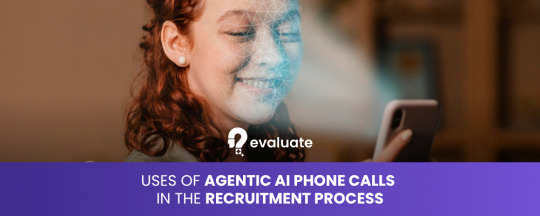
Hiring the right candidate is important for businesses to stay ahead of the competition. But the recruitment process is not easy. Managing high volumes of applicants and ensuring effective communication across diverse candidate pools overwhelms HR teams. One of the solutions to overcome these issues and to help HR teams streamline and humanise the candidate screening is Agentic AI Phone Calls. This powerful tool, designed by Evaluate Ai is helping companies of all sizes to conduct preliminary candidate screening in a smarter, faster, and more inclusive way.
What are Agentic AI Phone Calls?
Agentic AI Phone Calls refer to AI-based voice calls that mimic human conversation. They can perform the screening round of candidates. These smart agents are designed to communicate in a natural way, pose questions related to a particular position, and effectively obtain important information from candidates. These are conversational, dynamic, and adaptive calls, as opposed to traditional voice bots. They can talk to candidates in multiple languages. These Agentic AI Phone Calls can be employed for screening white-collar and blue-collar applicants, as well as in mass hiring programs.
Steps to Use Agentic AI Phone Calls
Using Agentic AI Phone Calls are easy and user-friendly. HR teams can set it up as follows:
Setting Questions: The first step is to enter questions based on the job description. These questions can be technical, behavioural, or situational, depending on the requirements of the job role.
Selecting a Language: HR professionals set the questions and then decide on the language for the screening call. Besides English, Evaluate Ai's Agentic AI phone calls accommodate over 20 regional Indian languages. When hiring for blue-collar roles where the applicants might not be fluent in English, these regional languages are beneficial.
Defining Conditions: HR teams can define concrete screening conditions and decision trees for the AI to use. For example, if a job requires the candidate to be based in Bandra, Mumbai, the AI will ask about the candidate’s current location, proximity to the job site and their willingness to relocate. Suppose the candidate does not stay near the job site and expresses unwillingness to move. In that case, the Agentic AI call can conclude the conversation early, marking the candidate as “rejected: location mismatch”, saving time for both parties. This feature can be utilised for different criteria depending on the requirements of the job.
Screening Calls are Conducted Automatically: The AI starts calling candidates after everything is set up and the start date is established. Because the tool is scalable, hundreds or thousands of candidates may be screened simultaneously.
Obtain Filtered Results: After screening, the AI cross-checks responses to the job specifications and gives a list of shortlisted candidates for the first interview round. Where necessary, particularly in blue-collar recruitment, where the candidates are not required to possess resumes, the system can also create them.
Features of Agentic AI Phone Calls and their Applications
The different features of the Agentic AI Phone Calls resolve numerous real-world hiring problems. The key features are as follows:
Language Support: The Agentic AI Phone Calls support 20+ Indian languages, such as Hindi, Tamil, Telugu, Bengali, Kannada, and others, as well as English. This feature helps companies recruit candidates from all walks of life without any language barrier.
Automatic CV Generation: The Agentic AI Calls generates a simple CV based on the answers given by candidates during the call. This helps HR teams in their recruitment of blue-collar workers by providing them with a uniform document for evaluation.
Condition-Based Filtering: The ability to set conditions for job location, availability, education level, or experience saves time and effort for both the candidate and the hiring company
Customisable Voice and Tone: HR teams can choose the voice and tone of their Agentic AI Phone Calls based on the various templates available.
Scalability: The tool is scalable, hence it is appropriate for small startups who want to screen a few applications as well as big companies who want to screen thousands of applications. Scalability ensures that growth does not slow down the quality or speed of the hiring process.
Role Flexibility: The tool is flexible and can be utilised to hire for many different types of roles. The Agentic AI Phone Calls can perform the screening round for any job role and level, such as software engineers, warehouse staff, customer service reps, delivery drivers, etc.
Advanced Flow Control: The ability to create conditional workflows enables the AI to handle intricate screening scenarios. It can modify conversations based on responses provided by the candidate, steer clear of extraneous questions, and focus on areas worthy of further investigation, leading to more effective and relevant interviews.
Final Thoughts
The time-consuming process of screening round, cultural and language differences in multicultural markets, and the difficulty of ensuring consistency across recruitment campaigns are all recruitment challenges of the real world today. These challenges are addressed by Agentic AI phone calls. Businesses using Agentic AI phone calls have a gigantic head start in terms of speed, efficiency, and candidate experience as they continue to compete for talent.
By combining the benefits of automation with the personal touch of human interaction, this solution allows HR teams to interact more intelligently, quickly, and meaningfully with candidates.
Are you ready to enhance your hiring process? To find out how Agentic AI Phone Calls could work for your business, speak with our expert today.
0 notes
Text
How AI is Transforming Hiring for Persons with Disabilities (PWDs) in India
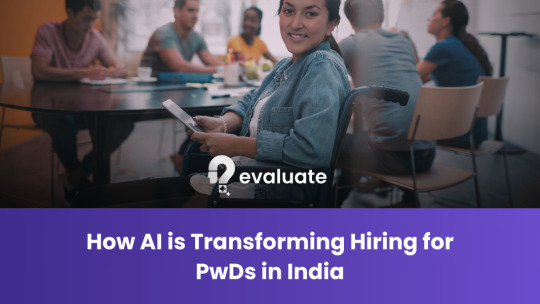
Imagine this: The job application of a highly qualified software engineer with extensive technical knowledge does not get past the initial screening process. This is not because they are incapable, but due to the traditional hiring systems that were not built keeping them in mind. This is not a hypothetical situation but a reality faced by millions of Persons with Disabilities (PWDs) across India.
However, this long-standing reality is changing. PWD candidates are now being recognised for their abilities, resilience, and preparedness thanks to AI-led, accessibility-first recruiting platforms like Evaluate Ai, as well as Rohini World's training initiatives and grassroots outreach. Through this collaboration, hiring procedures are being redesigned to be more human-centred, flexible, and inclusive, guaranteeing that opportunity is defined by ability rather than disability.
The Hidden Talent Crisis Nobody Talks About
According to the 2011 census, there are over 26.8 million people with disabilities in India, making it the largest country with PWD population. However, their employment rate is only about 36%. That's not just a statistic; it's a massive pool of untapped potential sitting right under our noses.
What many HR professionals fail to recognise is that the issue isn't a lack of talent. But it lies within the recruitment process itself.
Traditional recruitment methods often create barriers that are not immediately apparent. Resume screening tools are unable to handle various formats. Conventional interview procedures assume that everyone communicates in the same way and overlook the need for other ways of communication. Moreover, office infrastructure is built in a way that expects everyone to travel and be available in a say way, and assessment tools do not assess individual potential.
But what if the same technology that is revolutionising every other facet of business can also be used to knock down these barriers?
Barriers in PWD hiring
Although businesses are increasingly discussing diversity and inclusion (DE&I), actual hiring progress for people with disabilities is still non-existent. An article from The Economic Times HRWorld in 2023 pointed out that structured hiring practices for PWD are still in their infancy, with only a few companies like TCS and Reliance leading the way.
Key challenges include:
Resume Barriers: People who do not have access to assistive technology, formal documentation, or typing skills may find job portals and resume-heavy applications uncomfortable.
Interview Bias: In-person or face-to-face interviews are still vulnerable to unconscious prejudice, which can be impacted by things like speech, appearance, or perceived aptitude.
Inflexible Scheduling: Fixed interview schedules and assessments that require candidates to travel do not cater to all types of disabilities, particularly those affecting mobility.
Generic Assessments: Physically challenged or neurodivergent individuals cannot be accommodated by one-size-fits-all aptitude exams.
Low PWD Outreach: The majority of businesses lose out on a large and varied pool of candidates because they do not have direct access to trained and vetted PWD talent.
No Inclusion Metrics; Inclusion initiatives, even in forward-thinking companies, are frequently untracked, making it challenging to monitor or enhance actual results.
As per Michael Page, organisations often lack awareness of how to design jobs and workplaces that are accessible, not just physically, but also cognitively and digitally.
The Inclusive Answer: Evaluate Ai × Rohini World
This collaboration is a novel approach that combines technological innovation with grassroots implementation to address these issues from start to finish.
Evaluate Ai offers state-of-the-art AI recruitment technology, featuring voice-driven mobile interviews, unbiased evaluations, and human-like AI interactions that make the hiring process feel more organic rather than mechanical.
India's largest talent pool of persons with disabilities (PWD) is managed by Rohini World. It connects skilled individuals with inclusive employers and also provides upskilling opportunities for those in need.
Together, they're creating something unprecedented: a hiring ecosystem where disability becomes invisible, and ability shines through.
How the partnership works
Finding Talent: Throughout India, Rohini World’s network finds qualified PWD candidates. No long application forms or resume gatekeeping—just talent identification.
Skill Building: Rohini World trains PWD candidates for careers that are in demand today. This ensures that the candidates are job-ready.
AI-Powered Assessment: Evaluate AI's platform conducts natural, conversational interviews. The interviews are tailored to accommodate various requirements of PWD employees. Evaluate Ai’s Hum.Ai.n Engine evaluates candidates based on their skills and potential. It strives to remove bias; thus, the status of the evaluations are not affected by the disability of the candidates.
Smart Matching: Instead of just seeing the resumes, the Evaluate Ai and Rohini World partnership is structured in a way that it matches people with businesses based on cultural fit and skill sets. A ranked list of eligible applicants is sent to employers for follow-up interviews.
Continuous Learning: Over time, the AI enhances its ability to recognise even more suitable matches by analysing successful placements.
Real-World Impact: What This Means for Your Organisation
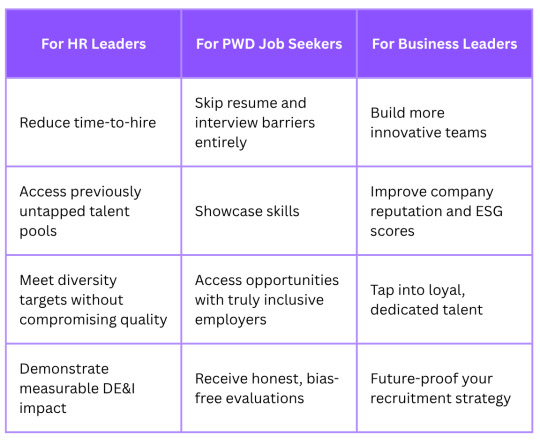
According the Accenture (2023), inclusive hiring is not just the right thing to do, but also a smart business move. Companies that actively hire PWDs report:
1.6× more revenue,
2.6× more net income,
2× greater economic profit
25% more productive (revenue per employee)
Twice as many positive Glassdoor reviews
Conclusion: Inclusion at Scale is Possible
The partnership between Evaluate AI and Rohini World represents a transformation in PWD and inclusive hiring, going beyond a mere technological initiative.
paradigm shift in inclusive hiring, not just a tech project. It demonstrates how inclusion can transcend HR strategy into everyday practice when technology is paired with empathy, accessibility, and execution. It shows how inclusive hiring can become a daily HR practice when technology is combined with empathy, accessibility, and effective execution.
If you're an employer looking to future-proof your workforce, now is the time to integrate AI with inclusion. The talent is out there. The tools are ready. The impact is measurable.
Are you ready to hire without barriers? Talk with our expert!
0 notes
Text
Debunking 9 Common Myths About AI in Recruitment

Organisations and HR professionals show excitement as well as concern regarding the use of Artificial Intelligence (AI) in recruitment. On one hand, many people celebrate its potential to revolutionise the recruiting process, on the other hand, some people show scepticism due to myths. These myths arise from out-of-date information or a lack of comprehension regarding AI's function in hiring. This blog aims to debunk the common myths about AI in recruitment and illustrate how cutting-edge platforms like Evaluate Ai are changing the future of hiring.
Myth #1: AI in Recruitment Is Only Used for Resume Screening
In the early days, AI was only used for screening resumes, but today AI is used for a wide range of functions, including talent sourcing, interview automation, and even candidate engagement. AI is currently used in all stages of talent acquisition, including sourcing, interviewing, and onboarding, according to SHRM 2024 Talent Trends. To evaluate soft skills, communication, technical, and problem-solving abilities, platforms like Evaluate AI provide sophisticated tools like the Hum.Ai.n Interviews. The tool mimics real-world, human-like interviews. Today's AI tools can conduct behavioural assessments, analyse video interviews, and provide real-time feedback. In short, they do not just see what is on paper but try to understand the candidate fully.
Myth #2: AI Replaces Human Recruiters
The belief that AI will supplant human recruiters is a common misconception in the HR industry. However, the truth is that AI empowers recruiters rather than replacing them. Time-consuming and repetitive tasks like scheduling interviews, following up with candidates, and preliminary screening are automated by tools like Evaluate AI's Virtual HR. This enables recruiters to concentrate on relationship development, strategic decision-making, and other high-impact activities. Relationship-building, empathy, and human intuition are still essential elements of effective recruiting and cannot be replaced by AI tools.
Myth #3: All AI Tools in Hiring are Biased
The data used to train AI tools leads to bias in AI. But when it is built responsibly and audited continuously, it can actually reduce human bias. In fact, when AI is used in recruitment, it makes it possible to filter candidates based on their performance and not based on their qualifications, race, gender, ethnicity, etc. By utilising a variety of datasets, carrying out frequent audits, and continuously improving models, platforms such as Evaluate AI eliminate bias from their hiring tools.
Myth #4: AI Can’t Assess Soft Skills or Culture Fit
Natural Language Processing (NLP), sentiment analysis, and behavioural pattern recognition are being used by modern AI hiring tools to assess emotional cues and soft skills. These tools assess soft skills, including communication, flexibility, and leadership potential, by analysing a candidate's voice, tone, facial expressions, linguistic patterns, and reaction time. Evaluate Ai integrates these assessments to provide employers with a detailed understanding of whether a candidate resonates with the organisation’s values and culture.
Myth #5: Only large corporations can afford AI recruitment software
This used to be true, but now AI hiring solutions are both accessible and scalable. Even start-ups and early-stage firms can benefit from automation thanks to the numerous AI systems available today that are designed to support all forms of organisations. Platforms like Evaluate Ai cater to small, mid-sized, and even large organisations, regardless of the number of candidates you are hiring.
Myth #6: AI Makes Hiring Impersonal
Numerous organisations hesitate to incorporate AI into their hiring process due to the belief that it eliminates the personal element. When implemented correctly, AI boosts personalisation. By offering quicker responses, more individualised communication, and regular follow-ups, it enhances the applicant experience.
Myth #7: AI Applies a One-Size-Fits-All Approach
It is no longer the case that AI use the same templates and scoring for all roles. Today's AI platforms are very configurable. Using Evaluate Ai recruiters an provide success indicators for every employment function, whether it is a technical or creative role. AI i more adaptable than traditional hiring methods due to its flexibility. Our solutions at Evaluate Ai are very customizable. We create assessments based on job descriptions, industry standards, and company values. Whether you're hiring a marketing lead or a software engineer, this guarantees fairness, accuracy, and relevancy.
Myth 8: AI in Recruitment Is Just a Passing Trend
AI in recruitment is often seen as a fad, something that is trendy now but will eventually disappear as businesses go back to traditional hiring methods. But according to studies, it is the future of hiring. According to SHRM 2024 Talent Trends, 88% of HRs mention that using AI in hiring helps them save time and improve their efficiency, while 35% mention that it reduces their hiring costs. Companies need smarter, faster, and more accurate tools to stay ahead of the competition in labour markets, where candidate expectations are changing and competition is growing.
Myth 9: Candidates Don’t Like AI Interviews
Many companies believe that candidates feel uncomfortable or mistrust AI interviews and prefer traditional interviews. A few years ago, this could have been the case, but today's job seekers, particularly Gen Z and Millennials, are becoming more at ease with technology. Many candidates AI interviews because they can be given the comfort of their home and at a time that is convenient for them. Evaluate Ai provides an engaging, adaptive experience that closely resembles human interactions, reducing any difficulties for candidates. By providing real-time feedback, transparent procedures, and user-friendly interfaces, it puts the candidate experience first and makes the process as smooth as possible.
Embrace the Reality of AI in Recruitment
It’s time to separate fact from fiction. AI in recruitment is designed to support recruiters and not replace them. At Evaluate AI, we're helping companies hire more intelligently and ethically while enhancing speed, quality, and equity. Our solutions are tailored to your specific employment requirements, regardless of whether you are a startup or an expanding business.
Book a free demo today and discover how Evaluate Ai can elevate your recruitment, without losing the human touch.
0 notes
Text
Steps to Implement Skill-Based Hiring
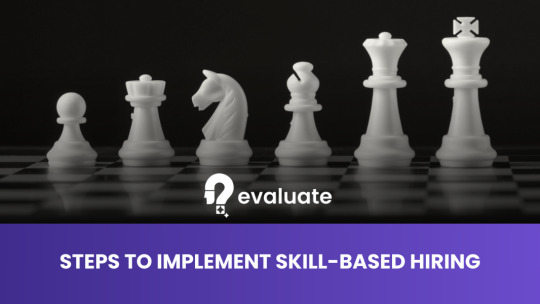
The way we hire is changing. Companies today need talent that’s ready to perform—not just candidates with impressive degrees or big-name universities on their resumes. That’s where skill-based hiring comes in.
This approach focuses on what a person can actually do, not just where they studied or how many years they’ve worked. If your company is thinking about making the switch, this blog will walk you through the key steps to implement skill-based hiring and how tools like Evaluate AI can make the process easier and smarter.
Skill-Based Hiring vs Resume-Based Hiring: What’s the Difference?
Resume-based hiring is still the norm deployed by most companies. This approach filters applicants based on their educational background and past work experience. While this method might appear efficient, it frequently overlooks talented individuals who have acquired skills in a particular field through alternative routes—such as bootcamps, self-directed learning, or practical experience.
Skill-based hiring, on the other hand, looks at what a person can actually do. Instead of asking “Where did you study?”, it asks “Can you do the job well?”
According to LinkedIn, more employers are moving away from degree requirements, and the number of job postings that do not require a degree are increasing.
5 Reasons Why Companies Are Adopting Skill-Based Hiring
Better hires. Candidates are assessed for what they can actually do and not how they look on paper.
Wider talent pool. Skill-based hiring helps companies reach a wider talent pool as they do not limit themselves to just college grads.
Faster onboarding. Candidates with the right skills typically require less training.
Less bias. Structured skill-based assessments reduce decisions based on personal background, history or assumptions.
Stronger retention. According to a two-year study by HBS, people hired based on their skills stay 20% longer than people hired using traditional hiring methods.
The OneTen report highlights that moving to a skills-first model also supports diversity and opens doors for groups often overlooked by traditional hiring systems.
Simple Steps to Implement Skill-Based Hiring in Your Organisation
It's not necessary to completely revamp your hiring process all at once. You can start with these simple steps:
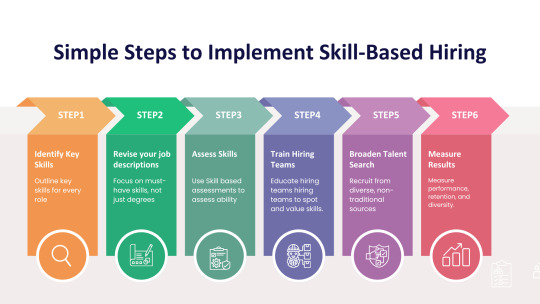
Identify Key Skills
Try to understand what skills actually matter for each job role. This could be done by studying skills that make top performers successful in their roles and asking team leaders about the skills required for a position. Once you understand key skills, outline them clearly for every role.
Revise your job descriptions
Instead of just degrees or credentials, mention the skills that are necessary to be successful in a role in the job descriptions. Be specific. When creating job descriptions, consider the tasks, resources, and soft skills like time management or communication.
Assess Skills
Skill-based assessments simulate real job tasks, such as writing a blog post or completing a coding challenge, to evaluate candidates' abilities. These assessments can cover a wide range of competencies, including problem-solving capabilities, technical competence, communication skills (writing, speaking, listening, reading), emotional intelligence, behavioural patterns, personality traits, role-specific competence, and industry-specific knowledge. Such tests give you a clearer understanding of who is truly qualified for the position.
Train Your Hiring Teams
Hiring teams need to understand the importance of skills over credentials. Guide them to spot skills effectively, interpret assessments and perform structured interviews that emphasise capability
Broaden Your Talent Search
Avoid limiting your recruitment to universities or prestigious colleges. Engage with boot camps, online learning sites, and local community programs. This approach allows you to connect with individuals who have acquired skills through unconventional methods.
Measure Your Results
Monitor the performance of your new hires. Are they achieving their performance objectives? Do they tend to stay longer in their positions? Study your diversity metrics. Utilise this information to refine your approach and improve over time.
The McKinsey report points out that skills—not just roles—should be the building blocks of your talent strategy.
How can AI help in Implementing Skill-Based Hiring
Switching to skill-first hiring takes time and effort, but the right AI tools can make it effortless. Platforms like Evaluate Ai help companies assess candidates beyond their resumes and traditional hiring filters. With the help of Evaluate Ai, companies can use various AI recruitment strategies to assess candidate skills.
Smart Talent Matching: Our AI platform can analyse candidate profiles and match them with job descriptions based on skill and not just keywords.
Skill-Based Assessment: The Hum.Ai.n Interview Engine can conduct real-time simulations of on-the-job tasks, linguistic, intellectual, behavioural and technical assessments to evaluate candidates accurately and objectively.
Bias Reduction: AI reduces unconscious bias in the recruitment process as it focuses only on a candidate’s demonstrable skills rather than big university names or past employers in their resumes
Time-Saving Automation: Apart from automating Skill-Based Assessments, Evaluate Ai can also help an organisation automate repetitive tasks such as screening resumes, scheduling interviews, candidate engagement, etc, thus helping hiring teams to focus on strategic tasks instead of manual work.
Scalability: AI helps organisations to maintain quality and efficiency in their hiring process, whether they are hiring for one or 1000 positions
The shift to skills-based hiring is a trend that is here to stay. A LinkedIn Talent Blog points out that “organisations are recognizing that work is evolving so quickly that degree-based hiring is too rigid to keep up.” (LinkedIn). Evaluate AI can help you gain a competitive edge by implementing skill-based recruitment at scale. Get in touch with us today to book your free demo!
0 notes
Text
The Future of Hiring: AI, Automation, and Skill-Based Recruitment
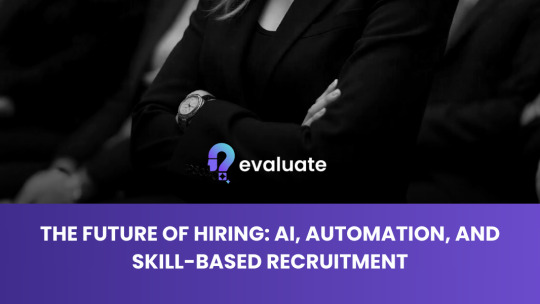
Finding the right talent can be difficult. It takes a considerable amount of time, resources, and may result in missing out on exceptional candidates. Does this sound familiar to you?
Using traditional hiring methods recruiters spend hours setting up interviews, sending emails, and reviewing resumes. Hiring in bulk only makes these issues worse. In addition to slowing down the hiring process, these inefficiencies increase drop-off rates and result in unsatisfactory candidate experiences.
The hiring process is currently being transformed by AI and automation, making it faster, smarter, and more efficient. Evaluate Ai is leading this change. The platform is making hiring smarter for both tech and non-tech positions. Whether you're a startup looking for your first engineer or a company hiring hundreds of customer service agents, Evaluate AI streamlines the entire process.
How AI Evaluation Improves Hiring
AI and automation aren't just buzzwords in the field of recruitment—they're transforming how companies find talent. According to a study, businesses using AI in their hiring process have cut their time-to-hire by up to 85%.
Connect with thousands in just minutes instead of weeks. The automation for candidate outreach is groundbreaking. Instead of contacting candidates one by one, Evaluate AI interacts with numerous candidates at once via phone, chat, and email bots. Say goodbye to endless hours spent on manual outreach.
Find the right skills, every time. The platform matches candidate skills with job requirements using intelligent AI algorithms. A potential applicant won't get overlooked only because they used different keywords.
Technical expertise that goes deep. For tech positions, Evaluate AI can access candidates across 48 domains and more than 18 technologies, including AI-ML platforms such as TensorFlow and PyTorch, full stack frameworks like React and Angular, as well as specialized competencies in cloud services (AWS, GCP, Azure) and mobile development (React Native, Flutter).
Interviews that fit modern life. Candidates have the freedom to interview at their convenience, using only their smartphone or laptop. This flexibility allows you to engage with a larger pool of qualified individuals who may not be able to attend traditional interviews.
Breaking language barriers. Evaluate Ai supports more than 15 Indian languages, thus eliminating language barriers for non-technical roles. This ensures that you do not miss out on skilled individuals merely due to language differences—perfect for recruiting across diverse regions.
See what's working, fix what isn't. Real-time dashboards provide clear insights regarding the performance of your recruitment process, allowing recruitment teams to constantly improve their strategies.
Effortless ATS Integration and Unified Talent Sourcing unify all aspects of the hiring process within a single system, removing data silos, thus enhancing candidate tracking.
Real Results That Matter
After integrating Evaluate AI, businesses in the banking, healthcare, IT, logistics, and pharmaceutical sectors have witnessed notable improvements in their recruitment procedures. Several have succeeded in cutting their hiring time by 70%.
Why is this important? Because hiring quickly helps businesses to secure top talent before their competitors do. It also makes the process less difficult for both recruiters and candidates, thus allowing your team to focus on what truly matters—expanding your business.
It is clear that in future, hiring managers will use automation, data, and focus more on skills rather than traditional resumes.In today's competitive talent market, companies who use platforms like Evaluate AI will have a significant advantage.
Ready to transform your recruitment? Get your free Evaluate AI demo today and see the difference for yourself.
1 note
·
View note